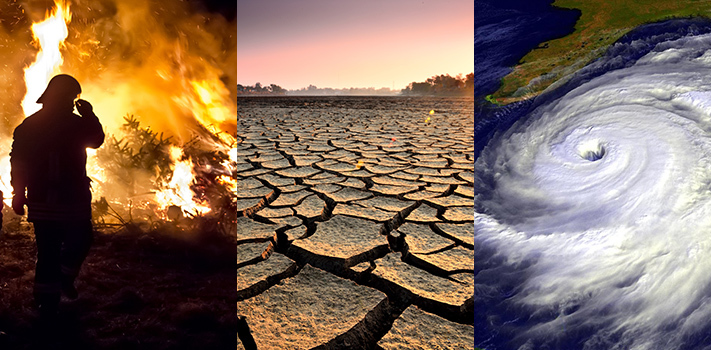Greenhouse
gas levels in atmosphere break another record, UN report shows
World Meteorological Organization


“The science is clear. Without rapid cuts in CO2 and other greenhouse gases, climate change will have increasingly destructive and irreversible impacts on life on Earth. The window of opportunity for action is almost closed,” said World Meteorological Organization (WMO) Secretary-General Petteri Taalas.
The WMO Greenhouse Gas Bulletin
shows that global concentrations of carbon dioxide (CO2), methane and nitrous
oxide have been increasing steadily over the past years.
In addition, the report notes a resurgence of a potent greenhouse gas and ozone-depleting substance called CFC-11, which is regulated under an international agreement to protect the ozone layer.
The WMO Greenhouse Gas Bulletin reports specifically on atmospheric concentrations of greenhouse gases, which are what remains in the atmosphere, following a complex process of emissions and absorptions.
In addition, the report notes a resurgence of a potent greenhouse gas and ozone-depleting substance called CFC-11, which is regulated under an international agreement to protect the ozone layer.
The WMO Greenhouse Gas Bulletin reports specifically on atmospheric concentrations of greenhouse gases, which are what remains in the atmosphere, following a complex process of emissions and absorptions.
Since 1990, there has been a 41 per
cent increase in the warming effect by the various greenhouse gases on the
climate – known as “radioactive forcing.” CO2 specifically accounts for about
82 per cent of the increase in radioactive forcing over the past decade,
according to figures quoted in the WMO report.
“The last time the Earth experienced a comparable concentration of CO2 was three to five million years ago, when the temperature was 2 to 3°C warmer and sea level was 10 to 20 meters higher than now,” said Mr. Taalas.
The WMO report comes on top of the evidence presented in the Intergovernmental Panel on Climate Change (IPCC) special report on global warming issued in October, which sounded the alarm on the need to reach zero net emissions of CO2 by mid-century, in order to keep temperature increases to below 1.5°C.
“The last time the Earth experienced a comparable concentration of CO2 was three to five million years ago, when the temperature was 2 to 3°C warmer and sea level was 10 to 20 meters higher than now,” said Mr. Taalas.
The WMO report comes on top of the evidence presented in the Intergovernmental Panel on Climate Change (IPCC) special report on global warming issued in October, which sounded the alarm on the need to reach zero net emissions of CO2 by mid-century, in order to keep temperature increases to below 1.5°C.
The report showed how keeping
temperature increases below 2°C could reduce the risks for the well-being of
the planet and its people.
“CO2 remains in the atmosphere for hundreds of years and in the oceans for even longer. There is currently no magic wand to remove all the excess CO2 from the atmosphere,” warned WMO Deputy Secretary-General Elena Manaenkova. “Every fraction of a degree of global warming matters, and so does every part per million of greenhouse gases,” she insisted.
This new report adds yet another building block of scientific evidence to inform decision-making at the upcoming UN climate change conference – the COP 24 – planned from 2 to 14 December in Poland. The key objective of this meeting is to adopt an implementation plan for the 2015 Paris Agreement.
“CO2 remains in the atmosphere for hundreds of years and in the oceans for even longer. There is currently no magic wand to remove all the excess CO2 from the atmosphere,” warned WMO Deputy Secretary-General Elena Manaenkova. “Every fraction of a degree of global warming matters, and so does every part per million of greenhouse gases,” she insisted.
This new report adds yet another building block of scientific evidence to inform decision-making at the upcoming UN climate change conference – the COP 24 – planned from 2 to 14 December in Poland. The key objective of this meeting is to adopt an implementation plan for the 2015 Paris Agreement.
Against the backdrop of the sobering
report, Michelle Bachelet, the UN High Commissioner for Human Rights, has sent a letter to all States, telling them
they have legal obligations under international human rights law to prevent
climate change and try to mitigate its effects.
“Human rights are under threat from
a force which challenges the foundations of all life, as we know it, on this
planet we share," she said, pointing out that the decisions taken CO P24
will govern climate action under the Paris agreement "for the indefinite
future," and said that "the rights of the millions of people [are]
threatened by climate change."
The global averages presented in the
WMO Bulletin are based on a rigorous tracking of the changing levels of
greenhouse gases as a result of industrialization, use of fossil fuels,
unsustainable agricultural practices, increases in land use and
deforestation.
The UN calls for urgent actions to
reduce greenhouse gas emissions at the national and sub-national levels.
Oksana Tarasova, Chief of the WMO
Global Atmosphere Watch Programme told UN News how these record high
greenhouse gas concentrations in the atmosphere raise the stakes and
sense of urgency ahead of COP 24